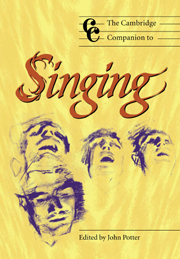Book contents
- Frontmatter
- 1 Introduction: singing at the turn of the century
- Part I Popular traditions
- Part II The voice in the theatre
- 6 Stage and screen entertainers in the twentieth century
- 7 Song into theatre: the beginnings of opera
- 8 Grand opera: nineteenth-century revolution and twentieth-century tradition
- Part III Choral music and song
- Part IV Performance practices
- Notes
- Select bibliography
- Index
8 - Grand opera: nineteenth-century revolution and twentieth-century tradition
from Part II - The voice in the theatre
Published online by Cambridge University Press: 28 September 2011
- Frontmatter
- 1 Introduction: singing at the turn of the century
- Part I Popular traditions
- Part II The voice in the theatre
- 6 Stage and screen entertainers in the twentieth century
- 7 Song into theatre: the beginnings of opera
- 8 Grand opera: nineteenth-century revolution and twentieth-century tradition
- Part III Choral music and song
- Part IV Performance practices
- Notes
- Select bibliography
- Index
Summary
Rossini's Guillaume Tell, first performed in 1829, defined the new genre of Parisian grand opera. This was grand indeed. Divided as a rule into five acts, with a ballet spatchcocked into at least two acts; on a historical subject, freely interpreted for maximum spectacle (in Berlioz's Benvenuto Cellini of 1838 the Pope and the College of Cardinals enter Cellini's studio just as the furnace explodes and the brand-new statue of Perseus rises from the smoke); educative intent built into the plot so as to show great historical forces arrayed in conflict – it all suited a bourgeois audience that welcomed notions of liberty and progress. Tyranny might win for the moment, yet the march of civilisation would prevail, helped on its way by sacrificial love: Halévy's La Juive (1835), Meyerbeer's Les Huguenots (1836) and Le Prophète (1849) hinted at freedom of worship, Tell and Verdi's Les Vêpres siciliennes (1855) at national independence, Verdi's Don Carlos (1867) at political liberty; each gave one plenty to look at, ballerinas' legs included. The whole thing took five hours or more and called for months of rehearsal to drill the hundred-strong chorus and get the vast, historically accurate sets right.
Rossini had carefully led up to Tell by adapting for Paris three of his Italian operas. Though his music had already taken Europe by storm, he altered it to meet French taste: he cut down ornamentation, allowed for more dramatic singing, and brought forward the chorus. The outcome each time was a great success.
- Type
- Chapter
- Information
- The Cambridge Companion to Singing , pp. 96 - 108Publisher: Cambridge University PressPrint publication year: 2000
- 3
- Cited by



